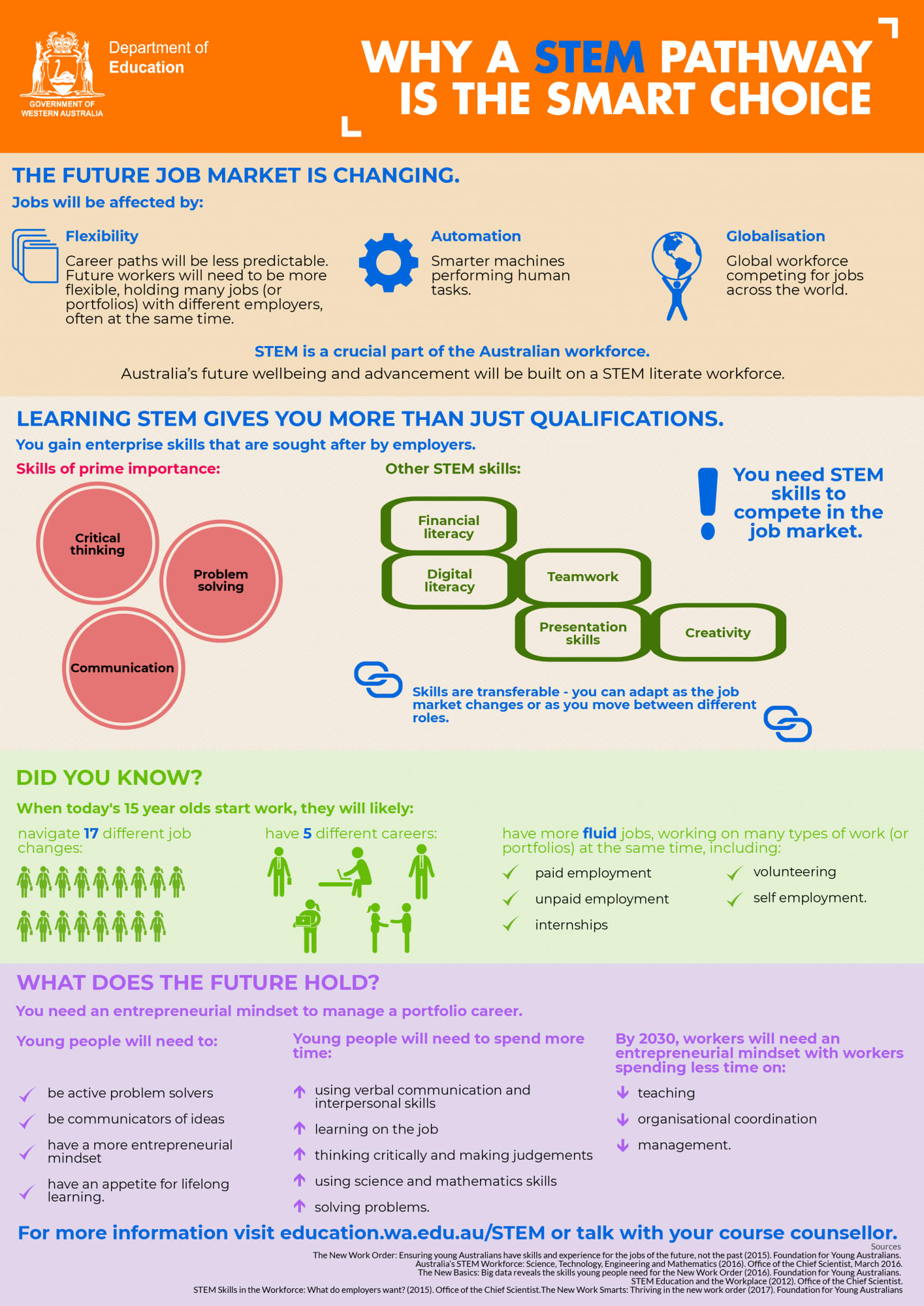STEM in the WA Curriculum
STEM in the WA Curriculum
The Western Australian Curriculum and Assessment Outline sets out the curriculum for children from Kindergarten to Year 10. STEM knowledge and skills are embedded across these subject disciplines.
In Years 11 and 12, young people work towards gaining their Western Australian Certificate of Education (WACE), choosing either an academic or vocational pathway.
There are a range of STEM related courses that children can access.
The S in STEM
Children from Pre-primary to Year 10 are required to study science.
The T in STEM
Technologies is a compulsory part of the Western Australian Curriculum. It includes two subjects that all children from Pre-primary to Year 8 must learn:
- design and technologies
- digital technologies.
The design and technologies subject allows students to study as least one of the following:
- engineering principles and systems
- food and fibre production
- food specialisations
- materials and technologies specialisations.
Technologies is optional for study in Years 9 and 10.
The E in STEM
Engineering principles can be integrated into science, technologies and mathematics learning programs.
Schools may also offer engineering as an elective subject in Years 7 to 10.
There are a number of pathways available to young people in Years 11 and 12 interested in studying engineering as part of their WACE.
The M in STEM
Children from Pre-primary to Year 10 are required to study mathematics.
You may also be interested in
Back Choosing STEM pathways
It is predicted that in coming years approximately 75 per cent of all new jobs will require qualifications and skills in the areas of science, technology, engineering and mathematics.

Why STEM is important
Employer demand for graduates with these qualifications and skills is on the rise and will continue to increase as job roles diversify.
However, a large proportion of students are not studying STEM subjects or considering STEM related careers.
Even more of a concern is 60 per cent of young people are studying for jobs that will not exist or will be radically affected by automation in the next 10 to 15 years.
Employment opportunities in STEM related industries are increasing each year. Employers are looking for:
- Analytical skills - Analysing and interpreting information and assessing the best course of action.
- Scientific skills - Breaking down complex scientific concepts and systems.
- Mathematical skills - Accurately gathering and analysing data. Applying simple and complex equations to solve problems.
- Technical skills - Troubleshooting and debugging a complex technological system or repairing a machine.
While obtaining STEM related qualifications is extremely important, studying STEM subjects also provides transferable skills that are essential to competing in today’s job market. These transferable skills include:
- problem solving
- creativity
- critical analysis
- teamwork
- independent thinking
- initiative
- communication
- digital literacy.
The workplace of the future requires strong foundation skills in science and mathematics. To compete, young people are encouraged to study STEM subjects as part of their Western Australian Certificate of Education (WACE), particularly the more challenging levels of science and mathematics. Choosing STEM subjects as part of the WACE opens the door to exciting and emerging careers, where young people can use their STEM skills to solve real world problems and have the ability to adapt to the changing workforce.
LIST OF STEM WACE SUBJECTS
| ATAR | ||
|---|---|---|
| Mathematics | Science | Technologies |
| Mathematics specialist Mathematics methods Mathematics applications Mathematics essential Mathematics foundation Mathematics preliminary | Animal production systems Aviation Biology Chemistry Earth and environmental science Human biology Integrated science Marine and maritime studies Physics Plant production systems Psychology | Applied information technology Automotive engineering and technology Aviation Building and construction Children, family and the community Computer science Design Engineering studies Food Science and technology Materials Design and technology |
| VET | ||
| Automotive Construction industries Engineering Information and communication technology Primary industries | ||
For more information visit School Curriculum and Standards Authority1
